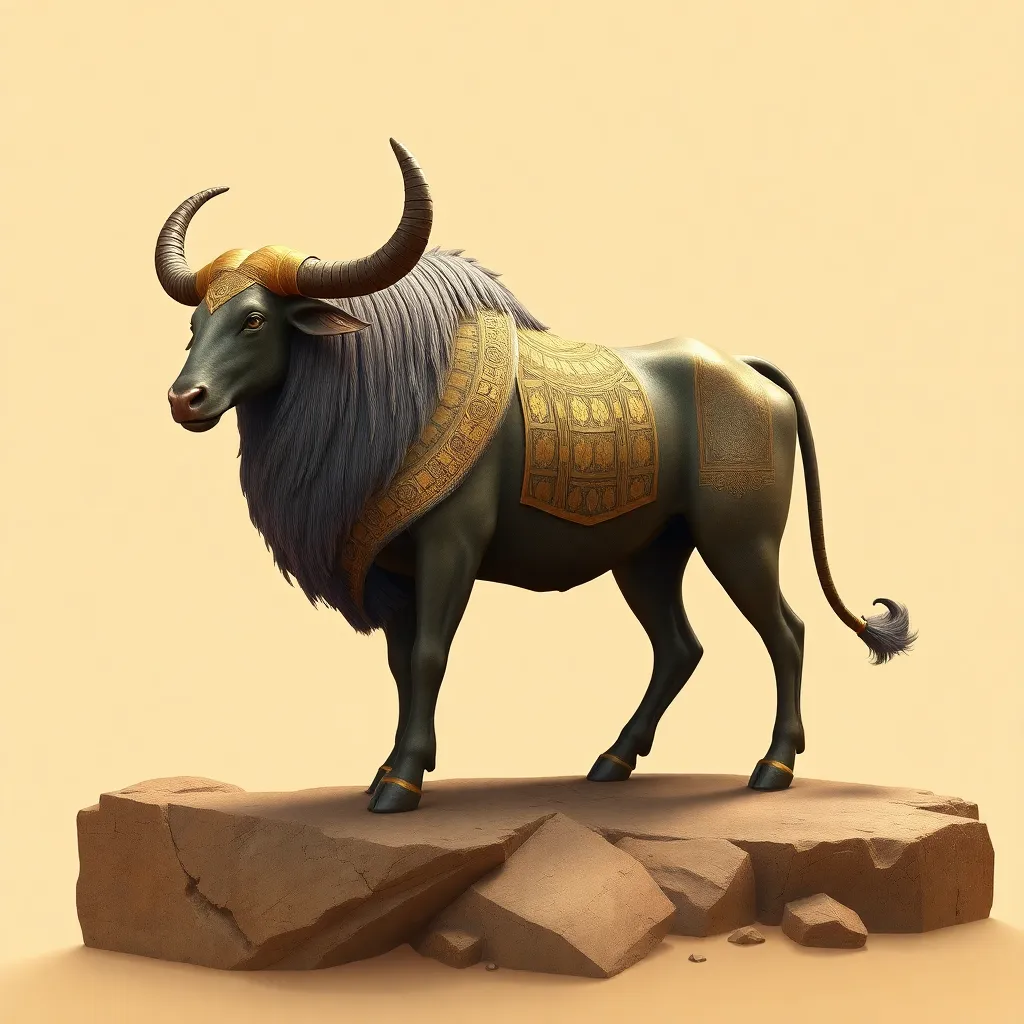The Apis Bull: Myths of Transformation and Divinity
I. Introduction
The Apis Bull holds a significant place in ancient Egyptian culture, representing not only strength and fertility but also a divine connection to the gods. This sacred animal was revered as a living embodiment of the god Ptah and was believed to possess miraculous powers of transformation and divinity. The myths surrounding the Apis Bull reveal deep-seated beliefs in rebirth and the cyclical nature of existence, emphasizing the importance of these themes in Egyptian mythology.
This article aims to explore the rich tapestry of myths and symbolism associated with the Apis Bull, shedding light on its historical context, its role in ancient rituals, and its lasting legacy in both ancient and modern cultures.
II. Historical Context of the Apis Bull
The origins of the Apis Bull can be traced back to the early dynastic period of Egypt, where it began to appear in religious iconography. Typically depicted as a black bull with distinctive white markings, the Apis Bull was believed to be a physical manifestation of the deity Ptah, the god of creation, craftsmanship, and architecture. As such, it played an essential role in the religious and cultural life of ancient Egyptians.
The Apis Bull was not merely an animal but a significant religious symbol. It was associated with the Pharaohs, who were seen as living gods on earth. The bull’s life and death cycle mirrored the Pharaoh’s divine kingship, and its worship became intertwined with the legitimacy of the ruler. The death of an Apis Bull was a national event, often followed by elaborate mourning rituals and a search for its successor.
III. The Apis Bull as a Symbol of Fertility and Abundance
Bulls were vital to agriculture in ancient Egypt, symbolizing fertility and abundance. The Apis Bull, in particular, was closely associated with the fertility rites that celebrated the renewal of life and the agricultural cycle.
- Agricultural Significance: As a powerful animal, the Apis Bull represented strength and fertility, essential for plowing fields and ensuring bountiful harvests.
- Myths Surrounding Fertility Rites: The ancient Egyptians believed that the Apis Bull’s presence could enhance fertility in both crops and livestock. Various myths depicted the bull as a divine force that brought prosperity and abundance.
- Rituals and Festivals: Festivals honoring the Apis Bull involved processions, music, and offerings. The most significant was the annual celebration known as the “Feast of the Apis Bull,” which marked the bull’s rebirth and the flourishing of the land.
IV. Transformation Myths: The Journey of the Apis Bull
Transformation is a central theme in Egyptian mythology, and the Apis Bull’s narrative is steeped in stories of metamorphosis and divine rebirth. The Egyptians believed that the Apis Bull underwent a cycle of death and resurrection, symbolizing the eternal nature of life.
- Concept of Metamorphosis: The Apis Bull was seen as a vessel of the divine, capable of transformation into the god Osiris upon its death, thus linking it to the afterlife.
- Stories of Reincarnation: Myths tell of the Apis Bull returning to life in a new form, demonstrating the belief in reincarnation and the continuity of existence beyond death.
- Connections to the Afterlife: The Apis Bull’s journey reflected the broader Egyptian understanding of the afterlife, where life, death, and rebirth were seen as interconnected phases of existence.
V. The Apis Bull and the Pantheon of Egyptian Gods
The Apis Bull’s relationship with the god Ptah is fundamental to understanding its divine significance. Ptah was the creator god, and the Apis Bull was viewed as his earthly manifestation.
- Relationship with Ptah: The bull was considered a symbol of Ptah’s creative power, bridging the gap between the divine and the mortal realms.
- Manifestation of Divine Power: The Apis Bull’s strength and majesty were seen as protective forces, embodying the divine will that governed the cosmos.
- Comparisons to Other Divine Animals: Similar to the sacred cats associated with the goddess Bastet and the falcon linked to Horus, the Apis Bull represented another facet of the divine animal symbolism prevalent in Egyptian mythology.
VI. Iconography and Artistic Representations
The Apis Bull is prominently featured in ancient Egyptian art, showcasing its revered status within the culture. Various artistic forms depict the bull with unique symbolic elements.
- Depictions in Art: The Apis Bull is often illustrated in temple reliefs, tombs, and sculptures, emphasizing its divine nature and importance in rituals.
- Symbolic Elements: Common motifs associated with the Apis Bull include the solar disk and wings, symbolizing its connection to the sun god Ra and the heavens.
- Sculpture and Architecture: Large statues of the Apis Bull were erected in temples, serving as focal points for worship and offering.
VII. Modern Interpretations and Cultural Legacy
The legacy of the Apis Bull extends beyond ancient times, influencing modern spirituality, art, and culture. Contemporary interpretations of the myths have allowed for a reevaluation of the bull’s significance.
- Influence on Modern Spirituality: The Apis Bull’s symbolism of strength and fertility continues to resonate in various spiritual practices today.
- Reinterpretations in Literature and Art: Modern literature often draws on the themes of transformation and divinity represented by the Apis Bull, reinterpreting its myths for contemporary audiences.
- Popular Culture Significance: The Apis Bull appears in films, books, and art, highlighting its enduring power as a symbol of ancient Egyptian beliefs.
VIII. Conclusion
In conclusion, the Apis Bull serves as a powerful symbol of transformation and divinity in ancient Egyptian mythology. Its role as a sacred animal linked to fertility, abundance, and the divine underlines the deep cultural significance it held for the ancient Egyptians.
The enduring power of the myths surrounding the Apis Bull continues to shape cultural identity, reflecting humanity’s quest for understanding life, death, and rebirth. This incredible creature remains a testament to the intricate beliefs of ancient Egypt, reminding us of the profound connection between the earthly and the divine.




